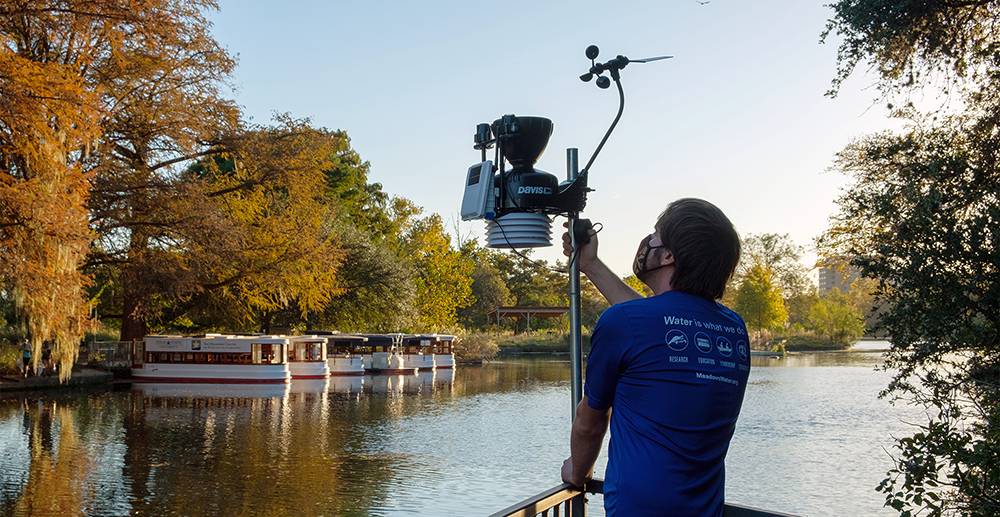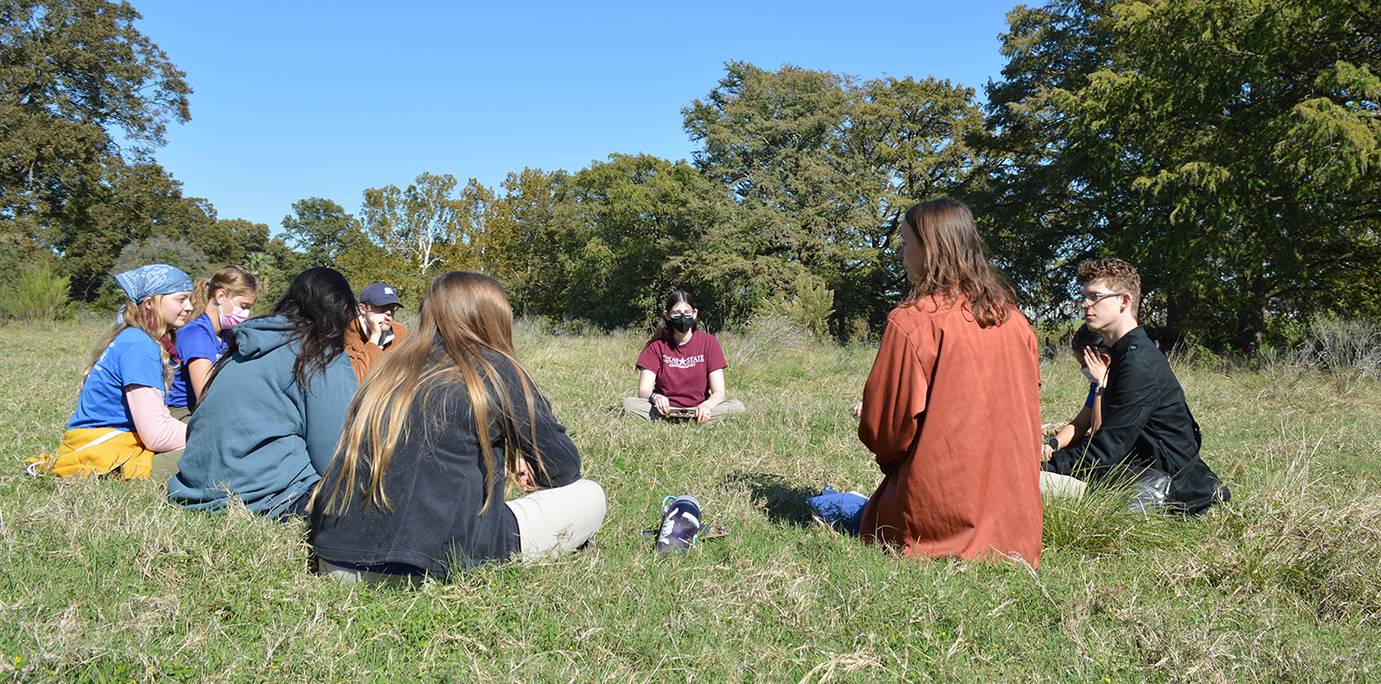Anna Huff | January 18, 2022

As scientific reports continue to confirm that climate change is increasing temperatures, causing more frequent weather extremes and raising the sea level across the globe, The Meadows Center for Water and the Environment at Texas State University is working to ensure that Texans will be able to adapt to the change with the release of a new blog, podcast and TEKS-aligned (Texas Essential Knowledge and Skills) climate education curriculum.
Thanks to a starting gift from the Meadows Foundation in early 2021, the blog, podcast and curricula are part of a larger climate program being developed by The Meadows Center that is aimed at conducting applied science, education and policy analysis to best prepare Texas for a changing climate.
“Climate change is affecting all aspects of water resource management in Texas and across the world,” said Rob Dussler, chief education officer. “These new initiatives will engage people of all ages and facilitate important conversations about science, climate change and how we can make a positive change in our communities.”
According to a 2020 report from the National Center for Science Education and Texas Freedom Network Education Fund, Texas was one of only six states to earn an “F” grade for its teaching of climate change in public schools. Moreover, teachers receive little to no guidance on how to incorporate climate change topics into their lesson.
“The state’s TEKS standards outline what students are to learn in each course or grade, so it was a priority for us to align the new curricula with these standards to reinforce the educational value of our new curricula and eliminate potential barriers to participation,” said Dussler.
To help bridge the gap in climate education, The Meadows Center now offers a Climate Explorers Group Tour and Mindfulness at the Meadows Group Tour. The tours can be adapted to meet the learning goals of any age group, from pre-school to high school, giving students the opportunity to explore this complex topic in an engaging and age-appropriate manner.
“Communities across the state must work together to tackle climate change, and that includes our students and children,” said Dussler. “This new curriculum will provide vital context and knowledge for the next generation of climate leaders and policymakers.”

The Climate Explorers Tour will feature hands-on activities that explore the ways in which our natural environment interacts with the changing climate. Groups will learn about the role a healthy riparian ecosystem plays in reducing effects caused by climate change and how students can be solution-based in their thinking about environmental stewardship.
The Mindfulness at the Meadows Tour will hone student’s nature observation skills and understanding of nature experiences. Students will receive instruction in mindfulness skills and use those techniques to find answers to research questions about their environment. Mindful noticing is the cornerstone to observing changes in our surroundings, and in turn, indicators of climate change and ecosystem health. The experiential activity will include a research study led by Dussler that examines mindfulness and nature connection.
The Meadows Center will also provide an opportunity for homeschool students to participate in the Climate Explorers Tour and the Mindfulness at the Meadows Tour as part of the Spring Lake Outdoor Academy class series on January 25 and February 22. For more information and to register, visit www.meadowscenter.txstate.edu/Education/outdoor-academy.html.
During the climate-focused group tours, students will take part in real-world applied experiences using data collected by a newly installed solar-powered air sensor and weather monitoring station at Spring Lake to measure air and water quality as well as weather trends and environmental changes. This hands-on, citizen science approach will help students understand the climate change indicators and their impacts.
“The interactive activities built into both of our new group tours offer a great way to help students feel a sense of ownership and motivation about the impact they can have,” said Dussler. “We hope students can feel at the end of our interpretive programs with the knowledge to make changes that build a more sustainable future.”
In addition to the new group tour offerings at Spring Lake, The Meadows Center has also released free lesson plans and resources for K-12 grade students that highlight important concepts connected to climate science. The lesson plans are available for download at www.meadowscenter.txstate.edu/ClimateChange/ClimateEducation.html.
At the core of The Meadows Center’s climate program is the intent to inspire informed conversation. The Hotter Than a Jalapeño blog and Fahrenheit 140° podcast cover topics at the intersection of climate change and water, ultimately inspiring greater climate action.
“The Meadows Center is home to a number of experts who are working to research and answer the questions that climate change pose to our water resources and our futures,” Carrie Thompson, director of operations said. “The new blog taps into the collection of emerging work developed by the Center to inform, challenge and inspire Texans to learn about the impacts of climate change and inspire them to contribute to addressing climate change in their daily lives.”
The blog will feature stories focused on a variety of topics in multiple formats, from analysis to contributions from The Meadows Center’s expert staff, to provide the public with clear, timely and science-based information about climate. The blog will also include classroom-ready teaching resources that can be used in formal and informal classrooms as well as home and virtual platforms.
The Fahrenheit 140° podcast, named for the temperature at which water scalds skin after six seconds, is a “climate rant with a Texas slant.” The monthly series features The Meadows Center Executive Director Robert E. Mace and Director of Operations Carrie Thompson and covers the latest research, stories and perspectives at the nexus of climate change and water.
"To address climate change, we need to understand it and make it a part of our daily dialogue," said Thompson. “The podcast provides a perfect forum to demystify and normalize this complex and daunting topic with the ultimate purpose of equipping the public with the knowledge, skills and mindset to tackle climate change.”
The Meadows Center has several other climate initiatives in the works, including hosting teacher workshops and professional development trainings for interpretive educators to increase knowledge and skills for incorporating climate change into curricula and environmental interpretive programs across the state.
Other plans include research initiatives, such as developing actionable climate change data and regional climate projection models for Texas to supply decision-makers with crucial climate change information that can support scientifically informed decisions about how climate change is affecting their water resources, and what their options are for creating resiliency against those effects.
To learn more about The Meadows Center’s climate program and available resources, visit https://www.meadowscenter.txstate.edu/ClimateChange.html. To view the Hotter Than a Jalapeño blog, visit https://jalapeno.wp.txstate.edu/. The Fahrenheit 140° podcast may be listened to or subscribed to at:
- Anchor: https://anchor.fm/meadows-center
- Apple Podcasts: https://podcasts.apple.com/us/podcast/fahrenheit-140
- Spotify: https://open.spotify.com/show/4RCEhilRjhgfN2ex2LPo7R
Share this article
For more information, contact University Communications:Jayme Blaschke, 512-245-2555 Sandy Pantlik, 512-245-2922 |
